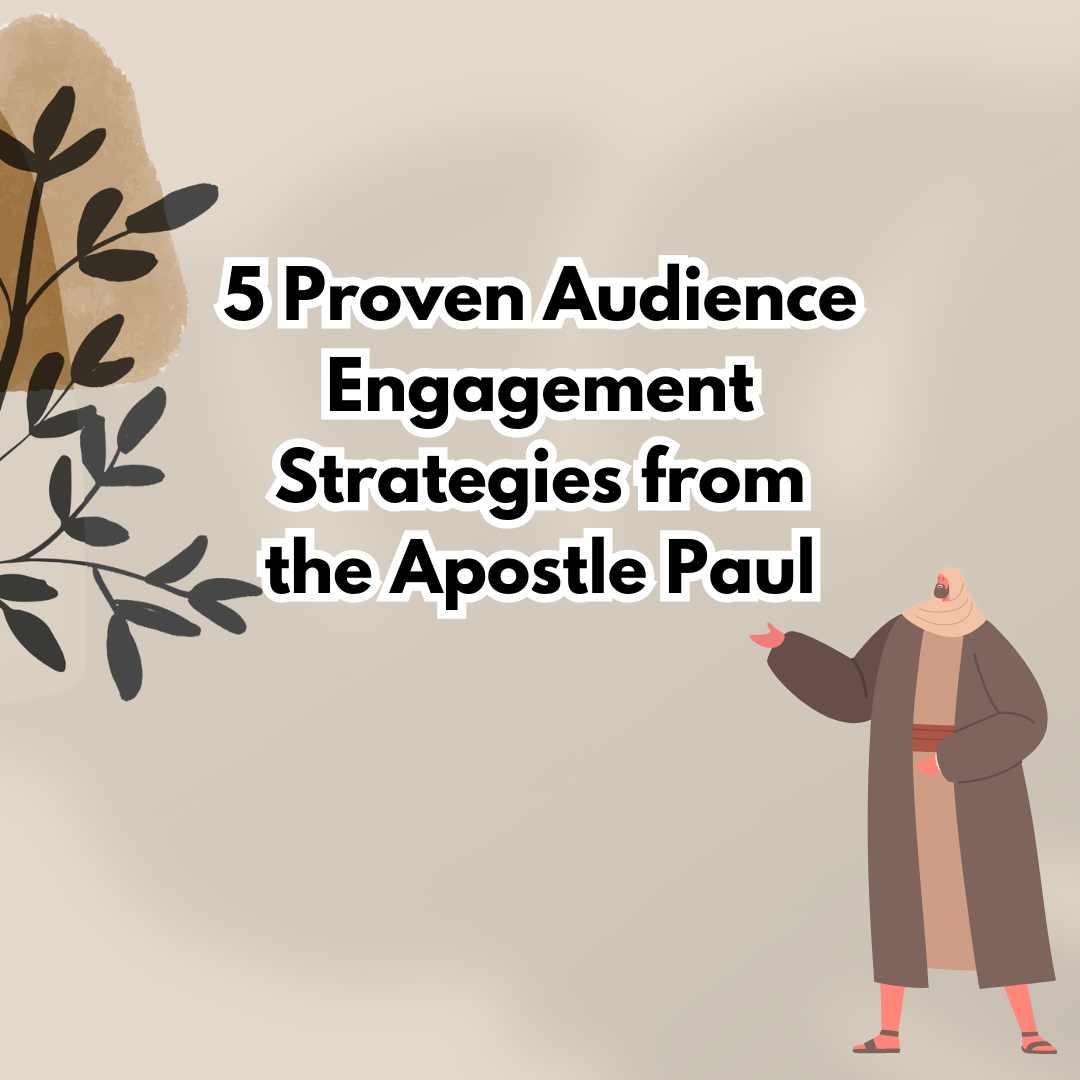3 October 2024
5 Proven Audience Engagement Strategies from the Apostle Paul
Paul: The Audience Specialist – Mastering the Art of Communication
As part of our series on Biblical Figures Who Can Teach Us Powerful Lessons on Influence (you can read about Moses here), today we focus on one of the greatest communicators in the Bible: the Apostle Paul. Paul’s ability to connect with diverse audiences—from Jews and Gentiles to Roman officials—while never wavering in the truth of his message is a masterclass in understanding and serving your audience effectively.

In a world where reaching the right audience is key to making an impact, Paul’s example is as relevant today as ever. Whether you’re a Christian author, leader, or someone simply wanting to share your message with clarity and conviction, Paul’s journey offers valuable lessons in how to resonate with the people you’re called to serve.
Paul’s Gift for Understanding His Audience
Paul’s ministry was remarkable for its scope. He didn’t limit himself to one group of people, but instead, adapted his approach based on the unique needs, cultural backgrounds, and spiritual readiness of his audience. In 1 Corinthians 9:20-22, Paul explains his strategy:
“To the Jews I became as a Jew, that I might win Jews; to those under the law, as under the law… to those who are without law, as without law… I have become all things to all men, that I might by all means save some.” (NKJV)
Paul wasn’t changing his message; he was changing his approach. He had a keen sense of how to make the gospel relevant without ever watering down its core truths. Whether addressing the intellectual Greeks in Athens (Acts 17), reasoning with Jewish leaders in synagogues (Acts 13:16), or appealing to Roman officials (Acts 26), Paul met people where they were—spiritually, culturally, and intellectually.
How You Can Connect with Your Audience
Paul’s success in reaching a broad range of people didn’t happen by accident. It was intentional, thoughtful, and Spirit-led. Here’s what we can learn from Paul’s example, with actionable tips for applying his methods in your own mission:
1. Know Your Audience Inside and Out
Paul took the time to understand the beliefs, customs, and concerns of each group he spoke to. When he addressed the Greek philosophers in Athens, he didn’t immediately preach about Jesus. Instead, he opened by referencing their altar to the “unknown god” (Acts 17:23), a point of connection that allowed him to introduce the truth of the gospel.

Actionable Tip:
Spend time researching your audience. Who are they? What are their pain points, challenges, and aspirations? What are they already seeking that you can connect to your message? Whether it’s through surveys, conversations, or simply observing their behavior online, the more you understand their world, the more effectively you can engage them.
Read our detailed blog about defining your audience here.
2. Speak Their Language
Paul was a master at using language that resonated with his audience. He didn’t use lofty theological terms with the common people, nor did he dilute his message with scholars. When speaking to Jews, he quoted the Torah and the prophets, referencing scriptures they were familiar with. With the Gentiles, he used logic and reason, meeting them on intellectual grounds. He tailored his communication to his listeners without compromising the gospel’s integrity.
Actionable Tip:
Tailor your language and tone to fit the context of your audience. Are they beginners in the subject, or are they more advanced? What terminology will they understand, and what concepts might need simplifying? Whether through writing, speaking, or content creation, be intentional about the words you use, ensuring they are both relatable and truthful.
3. Meet Their Needs First
In 1 Corinthians 9, Paul discusses how he became all things to all people to win some. This wasn’t about people-pleasing but about understanding that people are more open to receiving a message when they feel seen, heard, and understood. Paul didn’t just tell people what they needed to know; he started by addressing what they *wanted* to know. He then guided them to the truth of the gospel.
Actionable Tip:
Identify what your audience needs or desires. Are they looking for encouragement, practical advice, or a deeper understanding of faith? Address their immediate needs first, and then lead them to the deeper truths you want to share. This builds trust and creates a more meaningful connection.
4. Stay True to Your Core Message
One thing Paul never did was compromise the truth. Though he adapted his approach based on his audience, his core message always remained the same: the gospel of Jesus Christ. In Galatians 1:10, Paul makes it clear: “Am I now trying to win the approval of human beings, or of God? Or am I trying to please people? If I were still trying to please people, I would not be a servant of Christ.”
Actionable Tip:
Adaptability doesn’t mean losing your authenticity. Stay true to your values and your core message, even if that means some people won’t agree or resonate with you. Authenticity breeds trust, and people are drawn to truth, especially in a world full of noise and changing trends.
5. Be Persistent, but Know When to Move On
Paul didn’t waste time on people who outright rejected his message. In Acts 13:46, when faced with opposition from the Jewish leaders in Antioch, Paul boldly declared:
“Since you reject it and do not consider yourselves worthy of eternal life, we now turn to the Gentiles.”
Paul wasn’t afraid to move on when his message wasn’t being received. He understood that sometimes, the best thing you can do is focus your energy on those who are ready and willing to listen.
Actionable Tip:
Don’t be afraid to shift focus when something isn’t working. If a particular strategy, platform, or audience isn’t responsive, consider redirecting your efforts where you see more engagement. It’s about stewarding your time and resources wisely.
Communicate Like Paul
To help you apply Paul’s lessons in your own life and work, here are some actionable steps you can start today:
– Research Your Audience: Use surveys, social media, and conversations to learn more about your audience’s needs and desires.
– Adjust Your Communication Style: Consider the language and tone that will resonate best with your audience. Simplify or deepen your content as necessary.
– Address Their Needs First: What’s keeping them up at night? Speak to that pain point or desire before guiding them toward deeper truths.
– Maintain Integrity: Always stay true to your core message, even if you’re tailoring the way you deliver it.
– Be Willing to Pivot: If something isn’t working, don’t be afraid to change course. Focus on where you can make the greatest impact.
Conclusion: Influence Rooted in Truth
Paul’s ability to connect with diverse audiences while remaining faithful to his core message offers a powerful model for anyone looking to share their message effectively. Whether you’re an author, speaker, or leader, the principles Paul lived by are timeless. By knowing your audience, speaking their language, and staying true to your message, you can expand your influence while honoring the truth.
As we continue this series on Biblical Figures Who Can Teach Us Powerful Lessons on Influence, make sure to stay tuned for next week’s post where we’ll dive into the story of Esther: The Courageous Advocate.
What resonated with you most about Paul’s story? Share your thoughts in our group, and let’s continue the conversation!